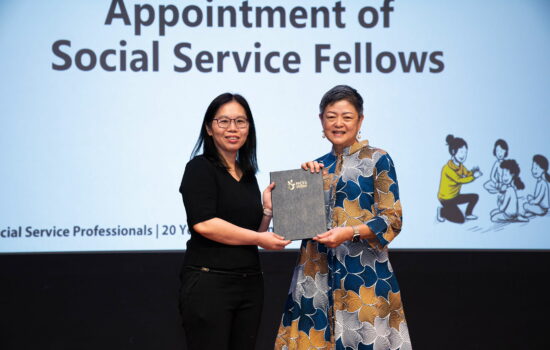Asia Pacific Breweries (APB) Foundation scholar Josiah Ong shares how his tics started, his challenges growing up with Tourette’s Syndrome and how he is proud to say he is living with his disability today.
My name is Josiah. I am 22 and am proud to say I am living with Tourette’s Syndrome. Of course, it has not always been something I was fully at ease with or proud of, but with the loving support of my family and friends, I was able to be more confident and embrace my diagnosis.
My Family
In my family, there are my parents, my older brother and I. Not long after I was born, my mother quit her job as a nurse to look after me. My father then became the sole breadwinner, and what he earned was just enough to tide us through.
My Tics
When I was five, my mother noticed that I began to twitch my cheeks, make grimaces and crimp my face. She thought they were just bad habits of mine and would tell me to try and control myself. Then she noticed I started cramping my fingers and toes too, and there were audible sounds from the tensing of my knuckles. The sound was like a ‘checkpoint’ for me, like an itch I had to scratch away, and I did not know why I felt so tense and uncomfortable all the time, unless I moved. My mother soon saw the difficulty with which I tried to obey her and control myself, and that I was really unable to suppress the tics all the time. She started telling friends they were not my habits, but instead, they were a part of me, and she accepted me for who I was. My brother and father were also never mad at me – they only showed me love and understanding.
Over time, the frequency with which I did these actions got higher and higher and new actions came about. I began making grunting and screeching noises as though I was ‘scratching’ the itch away in my throat, a place where I obviously could not physically reach with my hand. I also shrugged my shoulders and swung my arms to the point that I would be slamming my arm on the keyboard every five seconds, whenever I was in front of a computer. My cousins told me to be careful as I would spoil their keyboard at this rate. My uncle wanted to bar me from entering his house if I did not control myself and my neighbour told my mother to slap me to make me stop these “habits”.
At school, the kids would turn to stare at me whenever I had to clear the ‘itch’ in my throat. I disrupted classes whenever I made noises. I would twitch and turn my head every few seconds during tests and teachers would look at me sternly and suspiciously like I was attempting to cheat. I finished my tests just on time or left the last page out due to the lack of time. I could not really do sports well and hated PE (physical education) lessons. I remember being on the soccer field in an all boys’ school once and twitching, and before I knew it, I felt a sharp pain in my stomach, because someone had kicked the ball towards me and I had failed to catch it. It hit me hard, physically and mentally.
I felt like a freak, an aberration. Memories of my primary and early secondary school days were just the taunting faces of other kids imitating my twitching and laughing at me, or whispering among themselves and giggling. I did not really have close friends. The worst tic I recall was of me breathing hard, in the form of deep, quick gasps such that I perspired all over and people asked me if I was okay, thinking I was having an asthma attack.
Finding Solace
In the worst of these times, I found solace in songs. My mother bought me my first pop CD titled “Disney’s Refresh” and it was then that I discovered a love for singing. It took me to a place of comfort and respite – you could even call it catharsis. I also managed to find a best friend in secondary school and confided in him a lot, as well as learnt to ignore what people said or did about my condition.
Diagnosis
It was not until I was 14 that a friend told my mother the name of this condition I never knew I had – Tourette’s Syndrome. I saw a specialist at KK Hospital’s neurology department and was prescribed the drug Haloperidol, a high-potency sedative that from time to time made me giddy, especially when I had inadequate sleep. However, it reduced my tics by about 90%. With it, I did not feel the need to twitch as often as I used to. Things could not have been better for me and I started gaining confidence and learning appropriate social demeanor. I had previously been timid and afraid of social situations due to my tics.
I am now more confident and eloquent than I was 10 years ago. I am currently pursuing my degree in Business Administration at the National University of Singapore (NUS) and I hope to pursue marketing as my area of specialisation and career in the future. All this is thanks to family and friends who have always treated me like everyone else and never once singled me out for my tics. I am also extremely grateful to SPD and APB Foundation for awarding me their scholarship and believing in me. I have so many amazing opportunities and experiences to be thankful for, such as being able to go to Germany for my exchange programme at the University of Cologne through the generous help of my parents and the NUS Awards for Study Abroad (NASA) Scholarship, and being able to intern at APB Singapore’s corporate relations department and finding great colleagues and bosses there.
Things could not have turned out any better, and if given the choice, I would not change how my life has panned out. A motto that keeps me going is that there will always be dissenters and haters and people who will never believe in you, so you might as well stop trying to please or convince everyone. The most important person whom you should and must convince is yourself. Accepting yourself is the first and only step towards accepting others and accepting life. We do not get to choose the things that befall us, but we do get to choose the way we handle them, so just find your way of dealing with ordeals.
Everyone has their own way of dealing with adversity such as by singing, writing, doing sports etc. You will never be given more than you can handle, and if you do, you will not be alone. Learn to appreciate those whom you know have got your best interests at heart, especially your family.
Another belief I have is that it is okay to be sad when sadness calls, and to feel your emotions. That is why they are called feelings! They are meant to be felt, not denied. A lot of people feel a need to appear tough and avoid talking about how they feel altogether, but this will only make negative feelings fester. I think that it is absolutely okay to talk about and express these feelings somehow, and to share them with someone you trust. You will find that life is easier that way, and a lot lighter.





